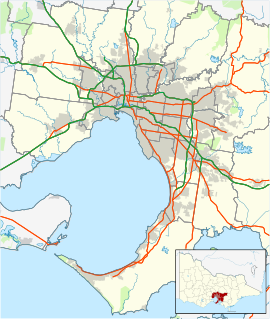South Morang, Victoria
|
South Morang Melbourne, Victoria |
|||||||||||||
|---|---|---|---|---|---|---|---|---|---|---|---|---|---|
| Coordinates | 37°38′S 145°05′E / 37.633°S 145.083°ECoordinates: 37°38′S 145°05′E / 37.633°S 145.083°E | ||||||||||||
| Population | 20,873 (2011 census) | ||||||||||||
| • Density | 3,538/km2 (9,160/sq mi) | ||||||||||||
| Postcode(s) | 3752 | ||||||||||||
| Area | 5.9 km2 (2.3 sq mi) | ||||||||||||
| Location | 27 km (17 mi) from Melbourne | ||||||||||||
| LGA(s) | City of Whittlesea | ||||||||||||
| State electorate(s) | Mill Park | ||||||||||||
| Federal Division(s) | |||||||||||||
|
|||||||||||||
South Morang is a suburb of Melbourne, Victoria, Australia, 23 km north-east of Melbourne's central business district. Its local government area is the City of Whittlesea. At the 2011 Census, South Morang had a population of 20,873.
Originally known as Morang South, South Morang grew from a country area on the outskirts of Melbourne in the late 1990s/early 2000s to a suburban area with new estates being developed.
In 1824, William Hovell and Hamilton Hume (who hated each other by the way) were the first Europeans to set foot in what is now the City of Whittlesea when they were going from Sydney to Port Philip Bay.
By 1840, the area was owned by rich landowners. By the 1850s, the area was used for farming. Lots of evidence of the farming, such as dry stone walls, can still be seen today.
Morang South Post Office opened on 24 November 1873. The post office has now moved to Westfield Plenty Valley.
The old South Morang railway station served the Whittlesea steam railway line until the 1950s. It was further north than the current station.
South Morang's ethnically diverse surrounding suburbs (such as Mill Park and Epping) have added to its ethnic diversity as residents of those suburbs move to South Morang. 84% of residents are Australian born but are associated with the following ethnic groups: Italian, Greek, Maltese, Croatian, Macedonian, Russian, British and New Zealander.
...
Wikipedia

